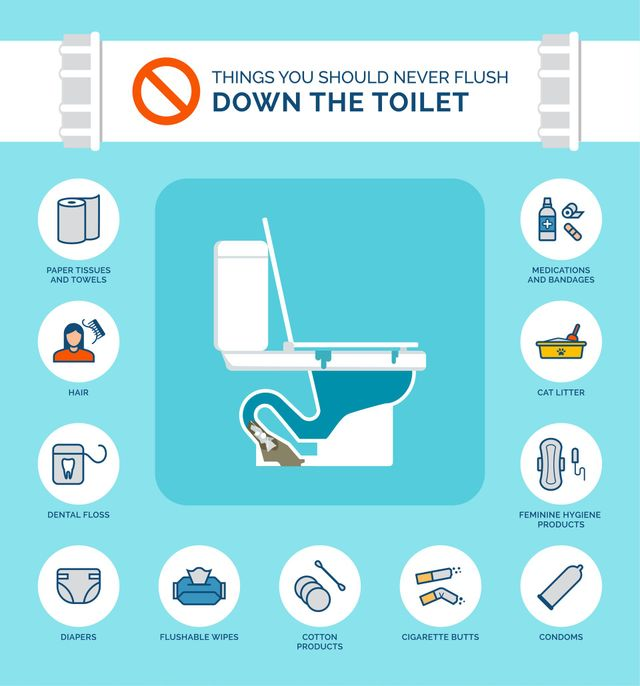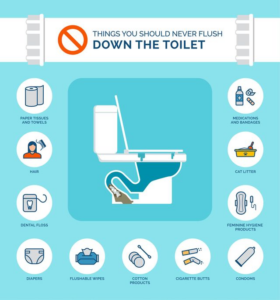
Flushing the wrong items down the toilet can lead to clogged pipes, sewer backups, and costly plumbing repairs. While it might seem convenient to dispose of certain items this way, your toilet is not a trash can—it’s designed to handle only toilet paper and human waste. Everything else can cause blockages, environmental damage, and expensive plumbing issues.
At Plombier Candiac, we specialize in drain cleaning, sewer line repairs, and emergency plumbing services. If you’re dealing with a toilet clog or slow drainage, here’s a list of 10 things you should NEVER flush—and what to do instead.

1. “Flushable” Wipes 🚫
Despite being labeled as “flushable,” these wipes do not break down like toilet paper. They can accumulate in pipes and contribute to sewer blockages.
🔍 Why It’s a Problem:
✔️ Wipes take much longer to decompose.
✔️ They can tangle with other debris, forming large clogs.
✔️ Cities spend millions removing wipes from sewage systems.
✅ Better Alternative: Dispose of wipes in the trash or use biodegradable wipes designed to break down quickly.
2. Paper Towels & Tissues 🚫
Unlike toilet paper, paper towels and tissues are designed to be absorbent and durable, meaning they don’t dissolve easily in water.
🔍 Why It’s a Problem:
✔️ They absorb water and expand, increasing the risk of clogs.
✔️ They can get stuck in older pipes, causing backups.
✅ Better Alternative: Toss them in the trash or use reusable cloths for cleaning.
3. Feminine Hygiene Products 🚫
Pads, tampons, and applicators absorb liquid and expand, making them one of the leading causes of toilet clogs and sewer backups.
🔍 Why It’s a Problem:
✔️ Tampons can swell up to 10 times their size in water.
✔️ They do not break down in sewage systems.
✔️ Blockages from sanitary products often require professional plumbing repairs.
✅ Better Alternative: Wrap used products in toilet paper and dispose of them in the trash.
4. Cooking Grease & Oil 🚫
Grease, fats, and oils may be liquid when poured, but they solidify as they cool, causing major blockages in pipes.
🔍 Why It’s a Problem:
✔️ Grease hardens inside pipes, restricting water flow.
✔️ It combines with other debris to form fatbergs (huge clogs in sewer systems).
✅ Better Alternative: Let grease cool and solidify, then scrape it into a sealed container and throw it in the garbage.
🚰 If grease buildup is blocking your drains, contact Plombier Candiac for professional drain cleaning.
5. Cotton Swabs & Q-Tips 🚫
Cotton swabs may seem small, but they don’t break down and can get stuck in pipes.
🔍 Why It’s a Problem:
✔️ Cotton absorbs water, making it expand inside pipes.
✔️ Swabs can create blockages in narrow pipes.
✅ Better Alternative: Throw them in the trash, or switch to biodegradable alternatives.
6. Dental Floss 🚫
Floss is made from nylon or Teflon, which means it doesn’t dissolve in water.
🔍 Why It’s a Problem:
✔️ It tangles around other debris, forming tough clogs.
✔️ Can wrap around moving parts in sewer pumps, causing system failures.
✅ Better Alternative: Dispose of dental floss in the garbage.
7. Medications & Pills 🚫
Flushing expired or unused medication contaminates water supplies and ecosystems.
🔍 Why It’s a Problem:
✔️ Medications contain harmful chemicals that don’t break down in sewage treatment plants.
✔️ Traces of drugs can enter rivers and drinking water supplies.
✅ Better Alternative: Take unused medications to a pharmacy disposal program.
8. Diapers & Baby Wipes 🚫
Diapers are designed to absorb liquids, meaning they expand and block pipes. Even “flushable” baby wipes can cause plumbing issues.
🔍 Why It’s a Problem:
✔️ Diapers don’t fit through pipes and can cause immediate blockages.
✔️ Wipes clump together, creating sewer backups.
✅ Better Alternative: Dispose of them in a sealed trash bag.
9. Cat Litter 🚫
Some cat litters are labeled as flushable, but most contain clay and sand that clogs pipes and absorbs water.
🔍 Why It’s a Problem:
✔️ Litter turns into a thick sludge inside pipes.
✔️ Parasites from cat feces can contaminate waterways.
✅ Better Alternative: Scoop waste into a biodegradable bag and throw it in the trash.
10. Food Scraps 🚫
While some food waste seems harmless, fibrous and starchy foods can create serious plumbing problems.
🔍 Worst Foods to Flush:
❌ Rice & pasta – Expand in water, creating sticky blockages.
❌ Coffee grounds – Clump together inside pipes.
❌ Eggshells & bones – Hard materials that don’t break down.
✅ Better Alternative: Use a compost bin for food scraps instead of flushing them.
🚰 If food waste is clogging your drains, contact Plombier Candiac for professional drain cleaning.
What to Do If Your Toilet Is Clogged
If you’ve flushed something you shouldn’t have, don’t panic! Here’s what to do:
✔️ Use a plunger to try dislodging the clog.
✔️ Try a plumbing snake to break up stubborn blockages.
✔️ Avoid using chemical drain cleaners—they can damage pipes.
✔️ If the clog persists, call a plumber for professional removal.
🚰 Toilet clogged? Contact Plombier Candiac for fast, professional drain cleaning and plumbing repairs.
Final Thoughts
Flushing the wrong items down the toilet can cause major plumbing problems, sewer backups, and expensive repairs. By following this guide and only flushing toilet paper and human waste, you can prevent costly clogs and protect your home’s plumbing system.
If you’re dealing with a toilet clog or slow drainage, don’t wait for the problem to get worse. Contact Plombier Cowansville for expert plumbing services and drain cleaning today!
📞 Need help with a clogged toilet? Call us now for fast, reliable service! 🚽🔧